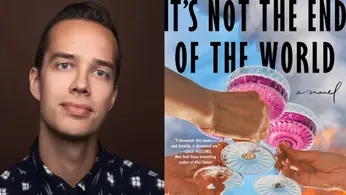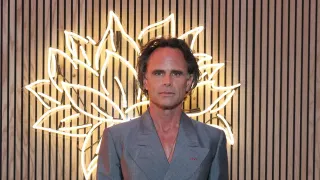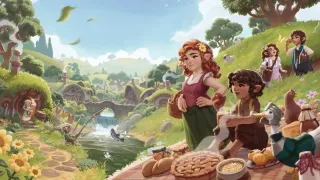
Jul 2
Review: Jonathan Parks-Ramage's Dystopian Novel Looks at the End of the World (and Beyond)
Lewis Whittington READ TIME: 3 MIN.
Despite being named "It's Not the End of the World," that phrase never appears in Jonathan Parks-Ramage's "cli-fi" novel. But it is hard to believe it isn't.
His three-part, dystopian story begins in 2044 in L.A. where the environment has changed so drastically that a pink mist blows in the wind that transforms people into flesh-eating zombies. There are also a myriad of other biohazards lurking on land under a neo-MAGA-oligarchy.
But despite this doomsday scenario, life is good for gay couple Mason Daunt, an artist, and Yunho Kim, a filmmaker; both are successful, and they're new dads. They are throwing themselves, and their surrogate mothers Astrid and Claudia (confined to a wheelchair), a $100,000 baby shower by the pool in their plush L.A. villa, which is protected by an expensive environmental shield that keeps the fast-approaching pink mist at bay.
Mason insists on picking up the flowers for the event himself (shades of "Mrs. Dalloway"), but finds himself delayed in LA traffic due to a massive crash where he witnesses gruesome violence. The shower goes off as scheduled, but ends disastrously, with Mason charged with murder and Yunho, Astrid, Claudia, and their newborn child disappearing.
The novel's second part takes place in a Montana retreat (owned by Mason) where his wife, surrogate, and child, named Gabriel, have relocated. It is four years later, and they are part of a Utopian progressive commune that is threatened by right-wing extremists who brand the commune "anti-family." The third section telescopes forward in time, with Mason (and other privileged elites) escaping Earth's troubles by relocating to a colony on Mars. Mason is now married to conservative queer entrepreneur Peter Thiel (that Peter Thiel) as Parks-Ramage mixes contemporary real-life figures with his fictional ones, exploring the collision between advanced technology and frail humanity.
Parks-Ramage takes today politics and conflates them to horrific extremes, which are most terrifying because they are shockingly believable. His phantasmagoric fiction is soaked in Kafkian 2.0 satire, with a slash of "A Clockwork Orange" and more than a cumrag splash of gay-lit porn. The latter can be found in the fantasy world that Mason escapes to when everything gets too heavy to cope – a virtual S/M landscape where he faux cheats on Yunho with VEX to exorcise his insecurities (yeah, that old story). With subplots taking place in virtual AI reality, fantasy and phantasmagoria, truth and illusion are up for grabs. (AI has evolved to the point where it can conjure both virtual worlds and holographic humans.)
Will Astrid and Claudia survive their own neo-survival nirvana in Montana? Will the custody of baby Gabriel ever be settled? Will Mason be convicted of murder even though he was under the influence of the "Pink Cloud Dysmorphia Syndrome (PCDS)?" Will Yunho reappear and be waiting for Gabriel at the commune, or is he having a time-out with VEX? And has Mason's mother finally accepted his queerness and started planning another shower after the pink dust settles?
Lastly, is there life on Mars, now that technology advances can prevent death (but not requisite plastic surgery)? This end chapter is a Roman a political clef with a bloody red-carpet list of the current monsters who populate our news cycles living it down on musky Mars a century later.
Parks-Ramage's collision of plot lines risks collapsing under its own narrative weight. While it can be tense and confusing, you will find yourself invested in the fate of these characters. Not to give anything away, but the denouement is so wild, it defies descriptives. Will "It's Not the End of the World" be the hottest novel on the beach this year? Only VEX knows for sure.
"It's Not the End of the World" is available from Bloomsbury Publishing. 384 pages, hardcover, $26.99







